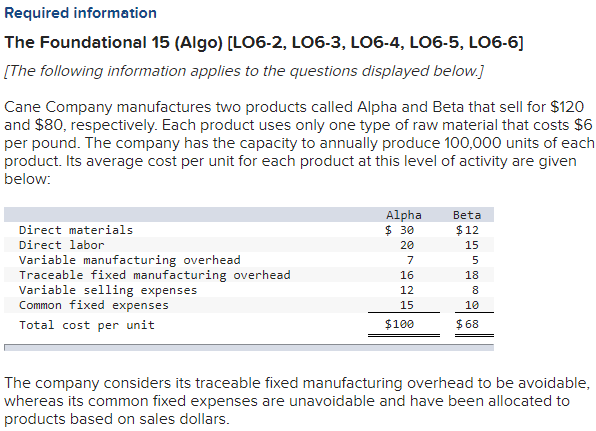Question
1. What is the total amount of traceable fixed manufacturing overhead for each of the two products? 2. What is the companys total amount of

1. What is the total amount of traceable fixed manufacturing overhead for each of the two products?
2. What is the companys total amount of common fixed expenses?
3. Assume that Cane expects to produce and sell 80,000 Alphas during the current year. One of Cane's sales representatives has found a new customer who is willing to buy 10,000 additional Alphas for a price of $80 per unit. What is the financial advantage (disadvantage) of accepting the new customer's order?
4. Assume that Cane expects to produce and sell 90,000 Betas during the current year. One of Canes sales representatives has found a new customer who is willing to buy 5,000 additional Betas for a price of $39 per unit. What is the financial advantage (disadvantage) of accepting the new customer's order?
5. Assume that Cane expects to produce and sell 95,000 Alphas during the current year. One of Cane's sales representatives has found a new customer who is willing to buy 10,000 additional Alphas for a price of $80 per unit; however pursuing this opportunity will decrease Alpha sales to regular customers by 5,000 units.
a. What is the financial advantage (disadvantage) of accepting the new customers order?
b. Based on your calculations above should the special order be accepted?
10. Assume that Cane expects to produce and sell 50,000 Alphas during the current year. A supplier has offered to manufacture and deliver 50,000 Alphas to Cane for a price of $80 per unit. What is the financial advantage (disadvantage) of buying 50,000 units from the supplier instead of making those units?
Required information The Foundational 15 (Algo) (L06-2, L06-3, L06-4, LO6-5, LO6-6] [The following information applies to the questions displayed below.) Cane Company manufactures two products called Alpha and Beta that sell for $120 and $80, respectively. Each product uses only one type of raw material that costs $6 per pound. The company has the capacity to annually produce 100,000 units of each product. Its average cost per unit for each product at this level of activity are given below: Direct materials Direct labor Variable manufacturing overhead Traceable fixed manufacturing overhead Variable selling expenses Common fixed expenses Total cost per unit Alpha $ 30 20 7 16 12 15 Beta $ 12 15 5 18 8 10 $100 $ 68 The company considers its traceable fixed manufacturing overhead to be avoidable, whereas its common fixed expenses are unavoidable and have been allocated to products based on sales dollarsStep by Step Solution
There are 3 Steps involved in it
Step: 1

Get Instant Access to Expert-Tailored Solutions
See step-by-step solutions with expert insights and AI powered tools for academic success
Step: 2

Step: 3

Ace Your Homework with AI
Get the answers you need in no time with our AI-driven, step-by-step assistance
Get Started


